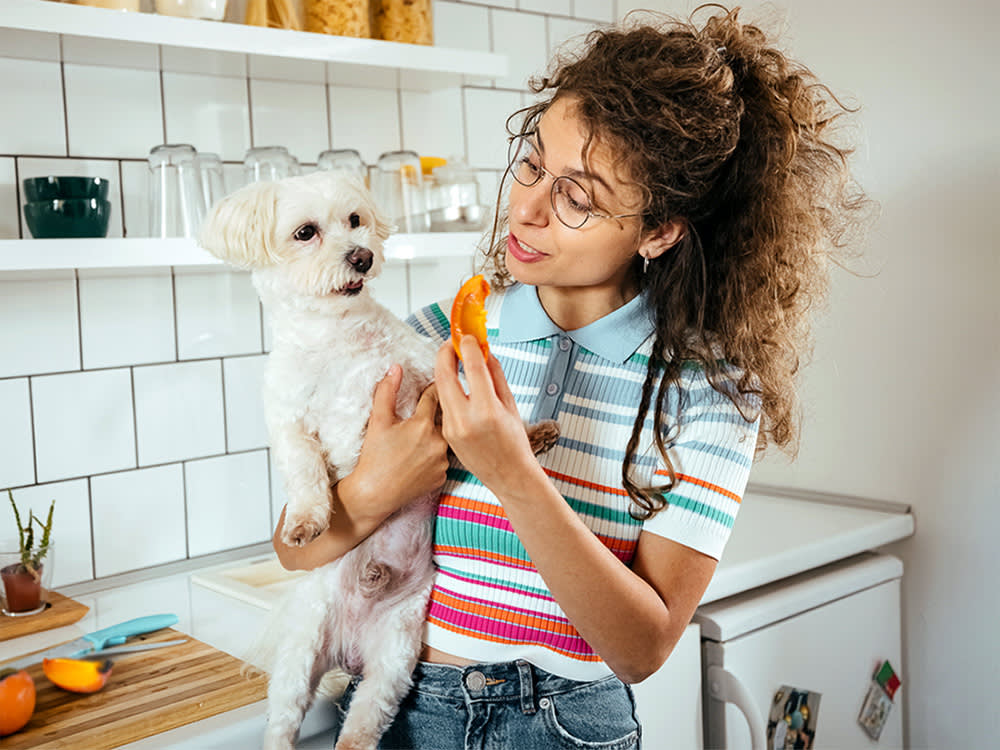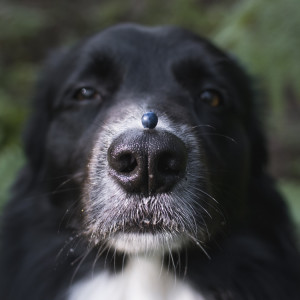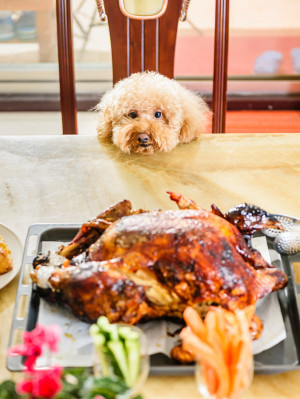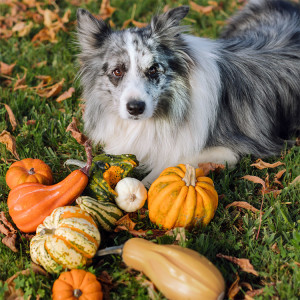Can Dogs Eat Persimmons?
There are some caveats to be aware of.

share article

Your pet wants you to read our newsletter. (Then give them a treat.)
Persimmons are beautiful orange-red fruits that are becoming more popular in the U.S. as people learn more about their amazing flavors and health benefits. If you are already a persimmon fan or want to be, you may be wondering if your dog can also indulge in a persimmon every now and again.
In fact, persimmons are safe for dogs as long as they are offered in small amounts and provided they only eat the fleshy part of the fruit. Read on to learn more about sharing persimmons with your pup.
Nutrition facts about persimmons for dogs
Persimmons are the fruits of trees in the Diospyros genus. Technically, the fruit is a berry although they are large and don’t look like typical berries from other plants. The most common varieties are native to Asia, and there is even a variety that is native to the US. The fruits that we usually find in grocery stores are either from the fuyu or hachiya cultivars, and they are very differentopens in a new tab.
Fuyus tend to be smaller and rounder, and they are considered non-astringent, meaning that they have a sweet crunchy flavor that can be enjoyed at any point during the fruit’s ripening. Hachiyas tend to be longer and thinner and are astringent, meaning that if you attempt to eat it before it is completely ripe, the tannins in the fruit cause a very unpleasant bitter flavor and uncomfortable sensation in your mouth.
Hachiyas cannot be eaten until they are so completely ripe you might think they are too ripe; they need to be mushy, and nearly transparent to be tasty. Ripe hachiyas are often used in cooking for this reason. Both cultivars provide a number of important nutritional benefits including lots of fiber, vitamins, and minerals.
Are persimmons good for dogs?
Like many fruits, persimmons can be a healthy snack for dogs as long as they are offered in small, safe portions. Some of the health benefits for your dog include:
Fiber: Persimmons contain lots of fiber, a carbohydrate that is not broken down during digestion. This helps to bulk up the stool, preventing constipatioopens in a new tabn and creating feelings of fullness without adding lots of calories. The fiber in persimmons also acts as a nutrient source for the good bacteria in the gutopens in a new tab.
Vitamin A: This is a fat-soluble vitamin that dogs need for normal growth, bone and muscle formation, reproduction, and healthy skin. Commercial dog foods are balanced to provide enough for your dog’s needs, so anything they get from treats and snacks is a bonus.
Antioxidants: Persimmons have long been celebrated for their health benefits, many of which are suspected to be the result of high concentrations of antioxidants in the fruit. Flavonoids and phenolic compounds in the fruit act as free radical scavengers, protecting cells from damage and possibly having anti-cancer, anti-inflammatory and anti-aging benefits that are still being studied.
Can dogs eat the seeds and skin of persimmons?
Dogs should not eat the skin or seeds of persimmons. This is because they can cause blockages within the stomach or intestines that can be life-threatening. Persimmons are somewhat unique in that when the skin and seeds of the fruit mix with stomach acid, the reaction can create a blob of fibrous material that becomes hard, difficult to break down, and is more likely to get stuck within the digestive tract.
This is known as a phytobezoar. It may intrigue or horrify you to learn that this can also happen in people, so everyone should avoid eating whole persimmons with the skin and seeds.
Are persimmons completely safe for dogs?
The flesh of the persimmon is fairly safe for dogs as long as they consume it in small amounts. Like any new food you introduce to your pup, it is important to offer just a small taste at first and make sure your dog tolerates it. Here are a few important points to keep in mind if you want to share a persimmon with your dog:
Hachiyas must be very ripe: Eating a hachiya persimmon before it is completely ripe can cause a very uncomfortable feeling in your dog’s mouth. They are also quite bitter before they are ripe due to high levels of tannins in the fruit. Be sure to wait until these fruits are completely mushy before sharing them.
High fiber content: Persimmons contain lots of fiber, which has important health benefits, but too much fiber too quickly can also lead to digestive upset. If your dog is not used to eating lots of fibrous foods, they may develop gasopens in a new tab, bloating, or diarrhea from eating too much fiberopens in a new tab. Start with just a small taste and see how your dog handles it.
Beware of phytobezoars: Don’t let your dog eat persimmons with the skin and seeds intact as these can lead to phytobezoars, or blobs of fibrous matter in the stomach that may cause life-threatening intestinal blockages. If your dog does eat a whole persimmon, be sure to contact your vet right away and monitor closely for signs of an obstruction which include vomitingopens in a new tab, not eating, lethargy, and belly pain. See your vet right away if you notice any concerning signs.
Other foods that are safe for dogs:
Apples are a safe opens in a new taband healthy snack for dogs.
Kale can be a healthy treat opens in a new tabin small amounts, too.
Eggs are also deliciousopens in a new tab and nutritious for pups.
Other foods that are dangerous for dogs:
Grapes and raisinsopens in a new tab are considered toxic to dogs.
Garlic, onions, and these other toxic foodsopens in a new tab should always be avoided.
Avocado isn’t a great choice for dogsopens in a new tab, either.
The bottom line: Can dogs eat human food?
There are lots of safe and healthy human foodsopens in a new tab you can share with your dog. There are also some that are not safe and can even be toxic. Be sure to do your researchopens in a new tab and verify what is safe and what is not. If you are not sure, always contact your vet or a pet poison hotline before sharing something questionable. Even safe foods should only be offered in small amounts as your dog needs to get the bulk of their calories from a complete and balanced dog food diet.
If your dog fills up on too many treats, table scraps, and snacks, they may not eat enough of their own food, and this can lead to nutritional deficiencies over time. Ideally, 90 percent of your dog’s total intake should be coming from their balanced dog food diet, with just a small set-asideopens in a new tab for treats and table snacks. Adding in small tastes of safe and healthy foods opens in a new tabcan be a fun way to enrich your dog’s pallet and bond over your favorites; you may be surprised at which foods your dog loves and which ones they spit out.
FAQs (People also ask):
How much persimmon can a dog eat?
Dogs should only eat small bite-sized portions of persimmon fruit. This is a very high fiber food and can cause digestive upset if they eat too much.
Is it OK to give dogs persimmon?
It is OK to give dogs bite-sized tastes of persimmon as long as there is no skin or seeds included.
Why do dogs like persimmons?
Dogs may enjoy the sweet flavor of persimmons as well as the texture. They are often curious about things we are eating in general.
Can dogs eat persimmon skin and seeds?
No; eating the skin and seeds can put dogs at risk for life-threatening blockages in the stomach and/or intestines.
Are persimmons good for dogs?
Persimmons are healthy and full of fiber, vitamins and minerals. They can cause digestive upset in large amounts and lack other critical nutrients that dogs need, however.
Are persimmons safe for dogs?
The flesh of the persimmon is safe for dogs in small amounts. They should not eat the skin or seeds, however.
References:

Dr. Amy Fox, DVM
Amy Fox, DVM is a small animal veterinarian in New York City. A lifelong animal lover, Dr. Fox studied biology in college and then worked as a veterinary nurse before pursuing veterinary school at Cornell University. She has worked in many different settings including shelter medicine, emergency medicine, general practice, and animal cruelty and forensics. She is especially interested in nutrition, preventative medicine and care for senior pets. Dr. Fox also enjoys writing about veterinary medicine and teaching. In her free time she loves to cook, garden, and go for long runs.
Related articles
- opens in a new tab
Can Dogs Eat Strawberries?
In moderation, strawberries are a tasty, healthy treat for your pup.
![A close up view of a dog with a blueberry resting on its nose]() opens in a new tab
opens in a new tabCan Dogs Eat Blueberries?
Yep — blueberries are a fiber and antioxidant-packed snack for your pup.
![A woman smiling at her dog while carrying a bowl of food.]() opens in a new tab
opens in a new tabIs Yogurt Good For Your Dog?
Yep, dogs can eat yogurt — it’s safe and healthy, and most dogs love it.
- opens in a new tab
Can Dogs Eat Turkey?
Before you invite them to the Thanksgiving table, here’s what you should know.
- opens in a new tab
Can Dogs Eat Ham?
That might be what you’re having for the holidays, but read here to see if your dog can partake.
- opens in a new tab
Can Dogs Eat Butternut Squash?
Your winter farmers’ market is full of the stuff. Find out if your dog can have some.








